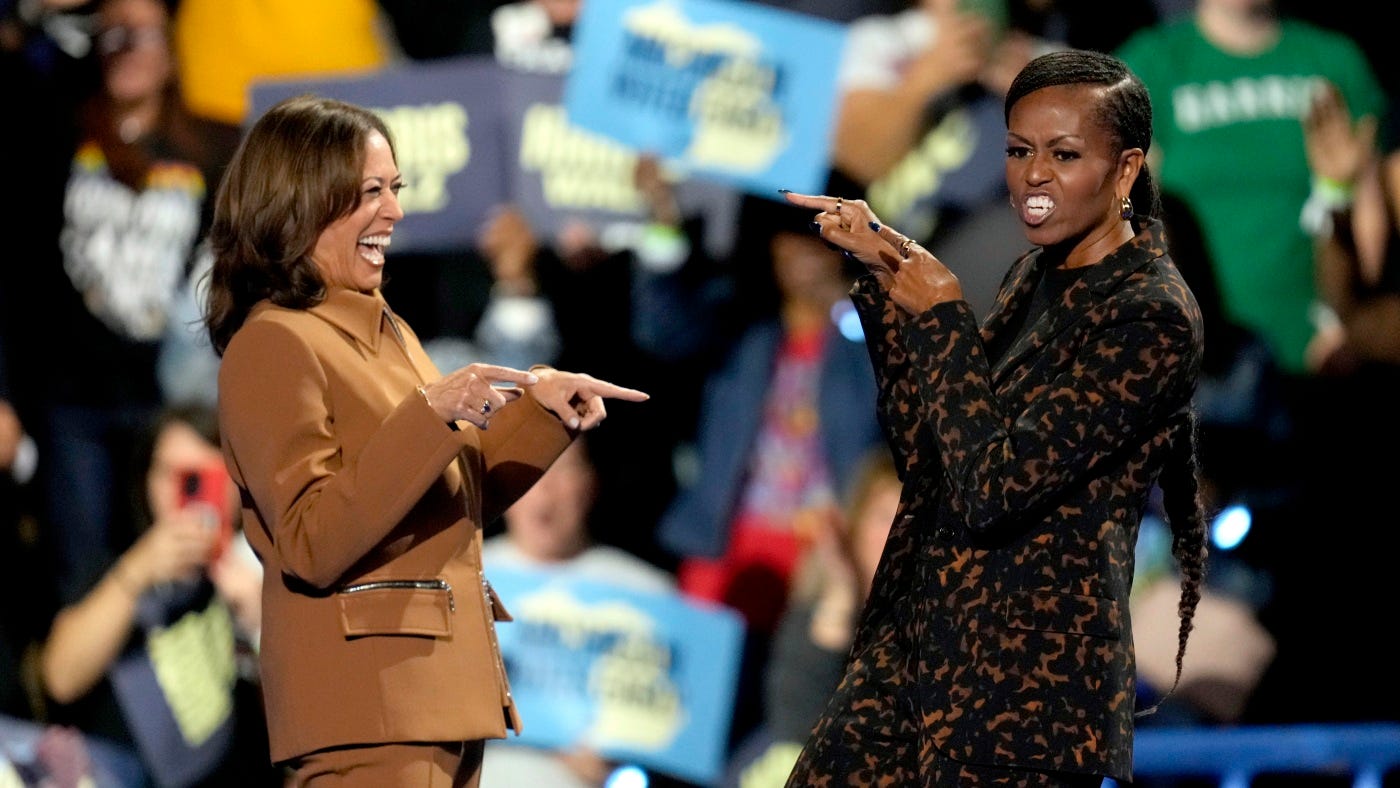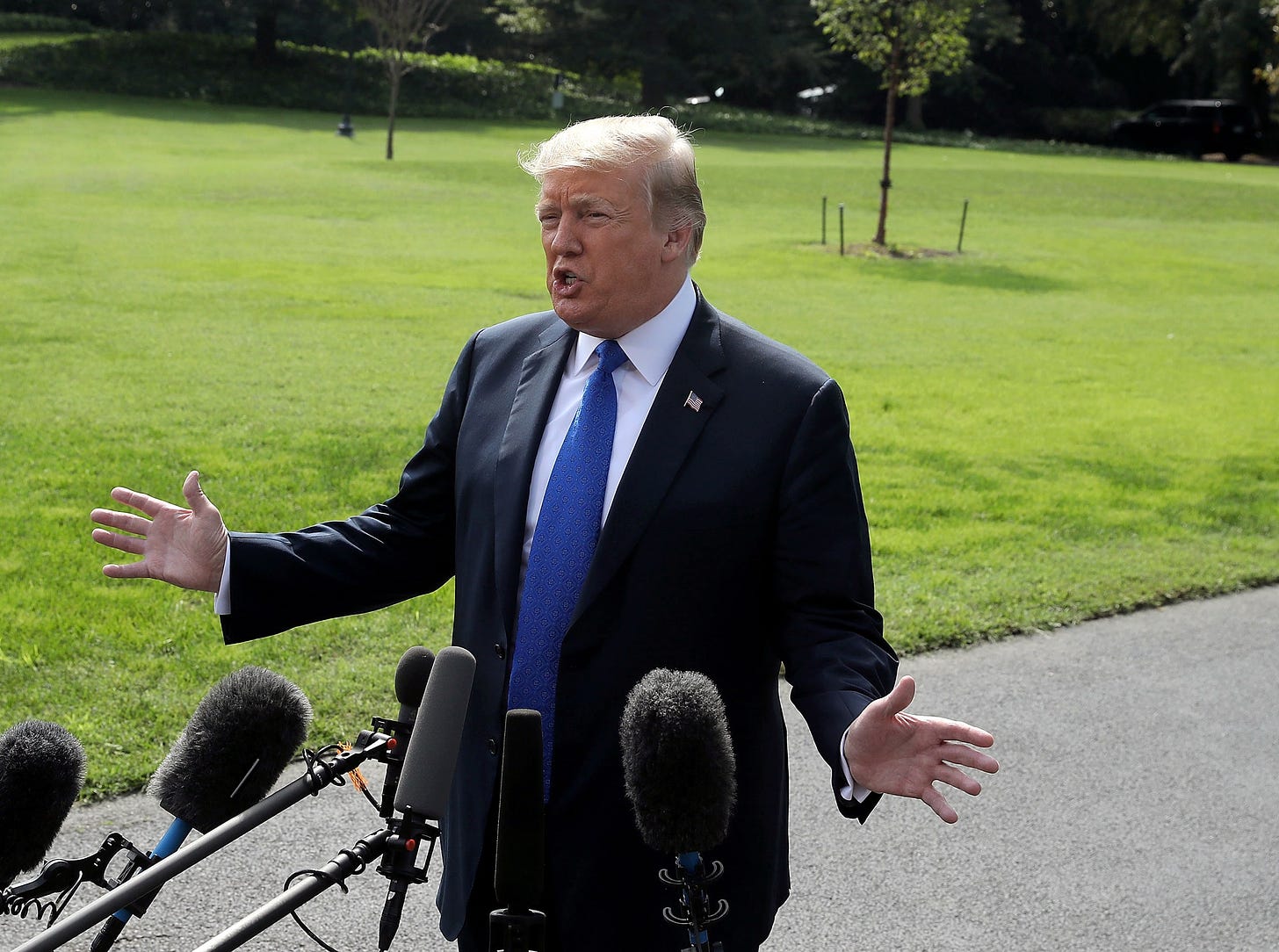Not the End, Not Even the Beginning of the End
But a modest defeat for feminism in Donald Trump’s victory
In the week following the American election results, a consensus of sorts has emerged: this was about men.
Whether in distasteful embrace of “bro” masculinity, or in celebration of a world in which “male traits can build rather than destroy” (in the surprisingly sympathetic words of Quillette’s Claire Lehmann), men were the ones who determined the election outcome, so the story goes. Donald Trump was victorious over Kamala Harris because he gave men permission to reject feminist dictates, including about abortion.
A good deal of the commentary on this theme, not surprisingly, has been negative, ranging from the sneering to the hysterical. There have also been raucous celebrations and upbeat analyses of the “rebellion of American men.” Even amidst the male-blaming and catastrophizing, the talk of sex strikes and husband-poisoning, there have been signs that the era of men being taken for granted as voters may at last be coming to an end.
Democrat Richard Reeves of the Brookings Institution under-stated the case when he pointed out that “Trying to either shame or guilt or scare men into voting Democrat was spectacularly unsuccessful.” Future Democratic campaigns, he suggests, will have to take men into account. Whether the Trump presidency will deliver on the hopes now raised among some men’s advocates remains to be seen.
**
First, a review: the Democratic campaign vision for men was notable for its anti-male contempt.
Democrats promoted a progressive masculinity, one that was explicitly subservient to women. Francis Wilkinson at Bloomberg praised VP candidate Tim Walz as a man who “can happily play second fiddle to a Black woman” and “doesn’t have to live in constant fear of losing status.” In case the implied insult to imagined Republican men (with their fragile masculinity) was not clear enough, Wilkinson concluded his piece with a direct address: “He’s not frightened of women, afraid of Black people or terrified of the future. Why are you?”
Riffing on the same theme, Sam Berry at The Los Angeles Loyalan, a campus newspaper, celebrated Walz for his “gentle masculinity” and willingness to “take a backseat to his running mate.” A soft man happy to play a supporting role to a DEI presidential candidate was purportedly attractive to young people (by which he seemed to mean young women). Berry interviewed a sociology professor at UC Santa Barbara who saw it as a positive that “Walz overall doesn’t express his masculinity” (whatever that means) and who asserted that “People [by which she seemed to mean women] are more happy to see a man support a woman in power rather than using his role as a man in society to benefit his own self.”
This was all embarrassingly hackneyed, and it suggested that the only good option for men was masculine non-entity and “second sex” status.
When it began to look as if soft masculinity was failing to take hold among male voters, some Democrats thought it a good idea to more aggressively demean the undecided, hiring a group of actors in the Man Enough ad to emphasize that the election was above all about pro-feminist compliance. “They [women] want to control their bodies,” one elderly fellow declared, “I say go for it!” Anything else was abuse. “I’m sick of so-called men domineering, belittling, and controlling women just so they can feel more powerful!” And then came the sad clincher for a fatherless generation: “That’s not how my mama raised me.”
Though fact-checkers rushed to make clear that the ad hadn’t actually been commissioned by the Harris/Walz campaign, it didn’t take a leap of imagination to recognize that it was on point. This was what the Democrats were peddling to millions of men raised to feel bad about being male: abortion stridency, more affirmative action, more talk about women’s rights, and none of it ever enough to stop the shaming.
Harris herself largely avoided feminist posturing, but there were high profile members of her inner circle who were more than willing to posture for her.
The most explicit feminist attack on men came in a remarkable address at a Harris rally in Kalamazoo, Michigan by former First Lady Michelle Obama, who took up where her husband had left off a few weeks earlier when he lectured the “brothers” about their alleged sexism. In a master class in female entitlement, Michelle Obama excoriated men for putting “rage” ahead of women’s abortion rights.
It was none of men’s business what a woman decided to do to her unborn child, she insisted, but it was every woman’s business to hector men about their choices and preferences. “To the women listening,” she exhorted “we have every right to demand that the men in our lives do better by us.” She did not mention any ways that women could do better by men. Accusatory and dismissive, she declared men’s indifference or opposition to abortion “a sad statement about our value as women in this world” and demanded of male audience members to choose “what side of history” they would be on.
In the end, a majority of men chose the wrong side.
Now we have the foreseeable reaction: the accusations, the threats of female reprisal and violence, countless videos of women screaming, crying, and howling. We will likely have cause to discuss them in the months to come. Even in the organs of elite opinion, a crude Apocalypse Now rhetoric took hold. Elizabeth Spier in The New York Times (“Trump Offered Men Something that Democrats Never Could”) claimed that Trump won because he offered men “a regressive idea of masculinity in which power over women is a birthright” and in which white men’s inadequacies and failures (she conveniently ignored the black and Latino men who also went for Trump) were projected onto women and minorities.
This view—that Trump is a woman-hater and the men who voted for him also woman-haters—has been repeated ad nauseum. As a result, “Will a Woman Ever Be President?” (also in The New York Times) has been the threnody on many quivering feminist lips. “It’s just nothingness in my head,” lamented one woman. “I can’t look ahead. I don’t know how to plan. I can’t picture the world we’ll be in and what it will really be like. I just know that it will be difficult and hard.”
With such emotional incontinence on display, one may feel satisfaction at the thought of men’s resistance, their preference for Trumpian swagger, for the man who raised his fist after being shot. But it is premature to read the election in these terms.
It turned out that the cross-racial coalition of anti-feminist men that some, including myself, were predicting did not materialize as decisively as had been hoped. Despite her campaign’s insulting demands, Harris still won about 78% of black male voters (though a friend insists that 22% or more of black men choosing Trump is a significant “finger in the wind.”) Of course, it’s not clear that men had feminism in mind at all when they rejected the Democrats. Many male voters identified illegal immigration, rising crime, loss of manufacturing jobs, runaway inflation, and the threat of foreign wars as primary concerns. “Disgust with feminist policies” or even “Preference for male leadership” are not included as options on exit-poll and other surveys. Moreover, a majority of white women (53% according to one source), but not black or Latina women, also voted for Trump, complicating assessments of gendered allegiances.
The country’s swing right was not, as many weeping women have assumed, primarily about denying women their so-called bodily autonomy. A number of states that Trump won, including Montana, Arizona, and Nevada, ratified abortion access through special ballot initiatives. Missouri, also a red state, saw a measure pass that will lead to undoing one of the most restrictive of state bans on abortion. In Republican Florida, a pro-abortion ballot initiative came close to reaching the 60% approval required for abortion access. That Trump will implement a nation-wide abortion ban—or even radically limit contraception, as fear-mongering about Project 2025 holds—seems highly unlikely. Trump himself has already stated that he would not sign a federal abortion ban. Nothing in his first term indicated that abortion is a major issue for him. Like so much else, the feminist outcry on this score is almost purely performative.
But more importantly, it is worth remembering that Trump's team has had almost nothing to say about men’s issues specifically. The biggest applause in many Trump rally speeches came when Trump vowed to keep men out of women's sports, hardly a significant male-positive issue. Trump's first major staffing decision after his win was to hire a woman (Susie Wiles, his campaign manager) as his Chief of Staff. Elise Stefanik was shortly thereafter nominated as US Ambassador to the United Nations. Kristi Noem was selected as Homeland Security Secretary while Tulsi Gabbard will be director of National Intelligence. The more women there are in government leadership positions, the more gynocentric the government will be.
Trump has often styled himself a promoter and “protector” of women. During his first term in office, he helped launch global initiatives that were typically feminist in assuming that only women are deserving of financial or other aid. His 2018 Women’s History Month webpage was full of feminist myths about female innovation and announcements of policies promoting women’s “economic empowerment.” In his 2019 State of the Union address, Trump notably congratulated the record number of women elected to Congress and boasted that it was women who were most positively affected by a roaring economy in which 58% of new jobs went to them. None of these Trumpian tendencies indicates a pro-male agenda or even a non-feminist one.
Still, Trump is the only North American leader—probably the only leader in the western world—to express unreserved sympathy for men in the #MeToo era, recognizing how easy it is to be accused, how difficult to defend oneself against career-ending sexual smears. His attempt to reform Title IX rules for college sexual misconduct tribunals to allow accused male students some degree of due process was laudable if only partially successful. (Biden, on the other hand, was rabid about punishing as many young men as possible.) These aspects of Trump’s first term were not negligible.
It is not clear how well Trump understands the myriad of serious issues facing men today or how willing he will be to act on them. His promise to dismantle DEI and restore merit-based hiring and college admissions bodes well for men. But there are more fundamental issues. Trump needs to abolish the Violence Against Women Act, for example, which funnels hundreds of millions in government monies to corrupt services and feminist propaganda. As Stephen Baskerville has repeatedly pointed out, many Republicans promote punitive anti-male laws and policies, particularly concerning child support and father responsibilities, without any equivalent attention to fathers’ parental rights. Not long ago, for example, Ron DeSantis waxed enthusiastic about forcing fathers to pay child support from the moment of conception, unconcerned about the extortion that would result. Unless Trump’s administration pays heed to the grotesque injustices that occur every day in family courts across the country and their disproportionate impact on fatherless sons—a subject that almost no one in the Republican party seems inclined to address—the dispossession of men and the expansion of the feminist deep state will proceed apace.
Richard Reeves is convinced that expanding gender equity programs to include men—recruiting more male teachers, offering more career and technical education, creating an office of men’s health, building a male suicide task force, and covering vasectomies under the Affordable Care Act—will solve many of men’s problems and bring them back to the Democratic fold. (He also mentions reforming family law, but he hallucinates in imagining that feminists will ever allow pro-father modifications). In general, further enlarging government will not help men. The majority of men want less oversight in their lives: fewer meddling social workers, fewer biased judges, fewer anti-male therapists, fewer campus tribunals, fewer boy-hating teachers, fewer feminist-compliant police officers, fewer domestic violence experts, and fewer regulatory agents. Many of these, however, are not about to disappear; some are well beyond Trump’s federal purview.
Feminists built their empire over a century, and it will not be easily toppled.
Trump’s election is nevertheless a qualified win for men. If politicians and campaign organizers take away nothing else from it than that demonizing masculinity is a losing strategy, that would in itself be a good thing. At least a smidgeon of ebullient defiance seems warranted. The feminists did not prevail, at least for the moment, and although we must brace for years of women’s marches, fantastical victimhood claims, and vicious anti-male propagandizing (it’s impossible to forget that #MeToo began under Trump), there is reason to believe that an anti-feminist cultural turn has been signaled. Men’s advocates on both sides of the party divide will continue to lobby for men’s issues, and those of us thoroughly fed up with feminism can know that we are not alone.








Twice-divorced (and still financially solvent!), I laugh out loud at the "feminist sex strike." Knock yourselves out, ladies. A successful strike requires two things: a relative monopoly and a superior product that the target desires, controlled by the strikers - neither of which is remotely the case with Western women these days. You're fighting the last war; ever since God invented the Internet and the gas-turbine jet engine, Western men not only see what those women bring to the table, they see what women in other parts of the world - particularly East Asia - offer, and for a few hundred dollars can be there in only hours. Sorry - you've jumped the shark, girls. Enjoy your cats.
Thank you so very much, Janice, for this incredibly insightful commentary! Every single issue you addressed is absolutely on point! One thing that never gets talked about in this OCD “women’s right to control their bodies” is what about the concerns/rights of the man by whom this woman got pregnant? Assuming there was some kind of committed relationship/marriage, I presume the man would care about her and this “life” that he had a part in creating. Apparently the male has no input. I am so beyond done with feminists “Me, Me, Me, Princess and the Pea” attitudes. Enough with Oprah, Beyonce, Taylor Swift, Michelle & Barack Obama, Joe Biden et al for birthing this absurd female empowerment/metoo farce & for demonizing males in the process in order to gin up emotional females to vote for and donate to the Democratic Party! Janice, please keep up your writing. We need your voice!